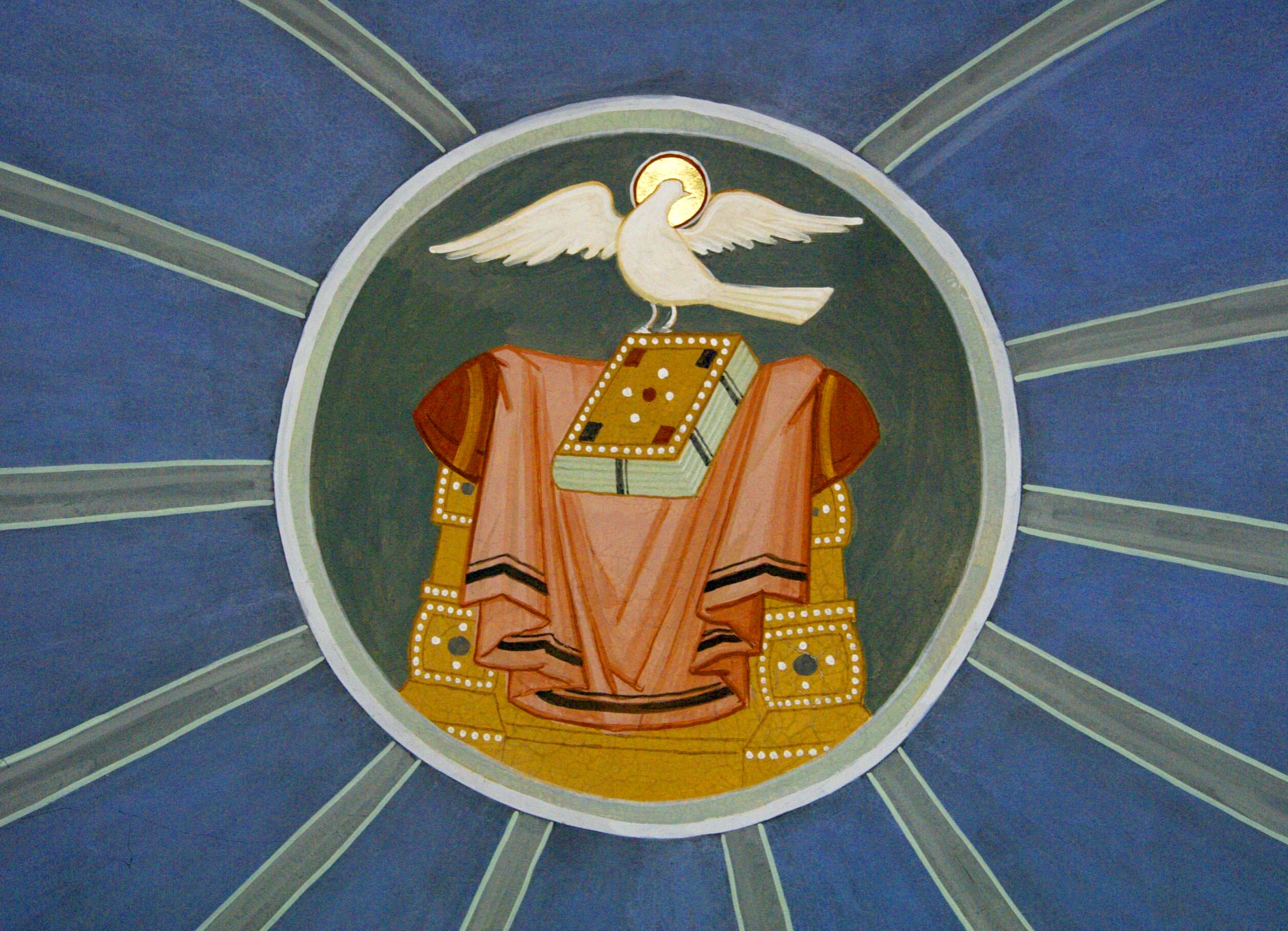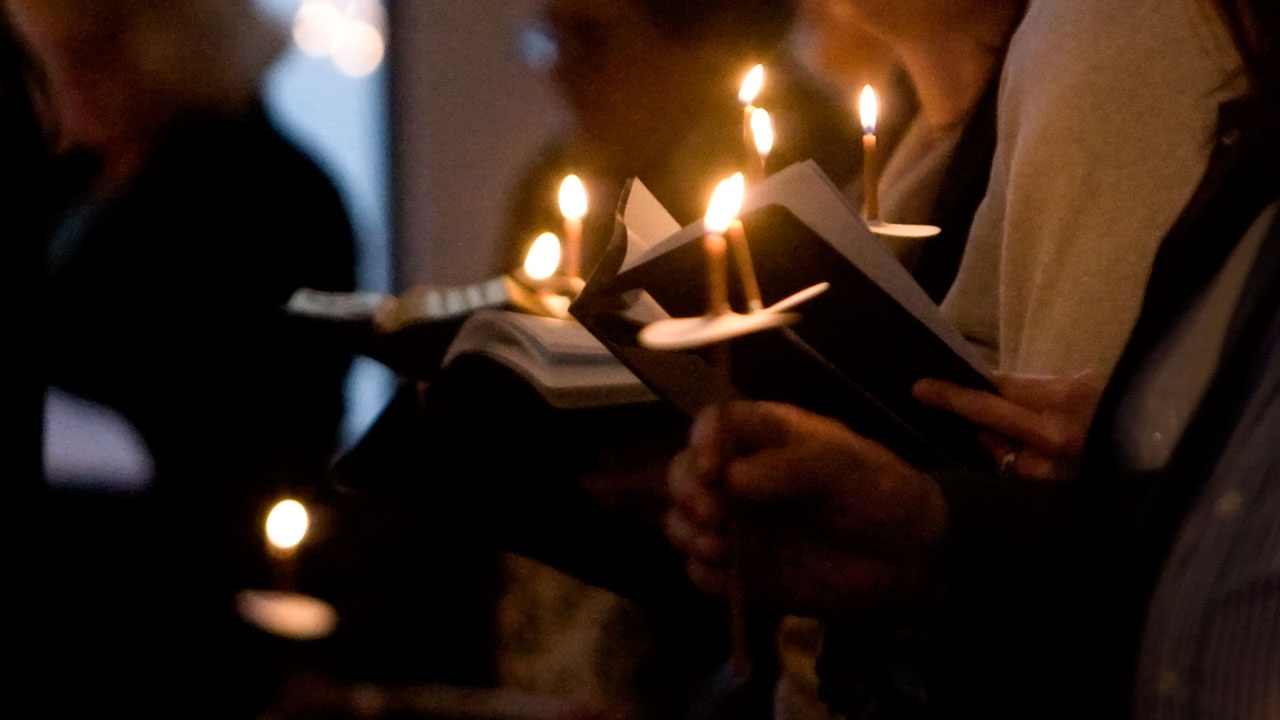Our Faith
The essence of the Orthodox Christian faith is expressed in Nicene Creed. This ancient statement of belief was formulated by the bishops of the Church in the year 325 at the Council of Nicaea, and it was confirmed in 381 at the Council of Constantinople. It clearly lays out the teachings that were handed down by the Apostles.
One God, the Father
“We believe in one God, the Father Almighty, Maker of heaven and earth, and of all things visible and invisible.”
(Deut. 6:4, Eph. 4:6, Gen. 2:4)
Orthodox Christians are monotheists. We believe there is one God, and as his children and the creations of his hands, we call him Father. He is the eternal source and is the ultimate reality, beyond existence itself.
The Father is the eternal source of all things, created all things out of nothing, and continuously holds all things in existence.
One Lord, Jesus Christ
“And in one Lord, Jesus Christ, the Son of God, the Only-begotten, Begotten of the Father before all ages, Light of Light, True God of True God, Begotten, not made, of one essence with the Father, by Whom all things were made.”
(1 Cor. 8:6, 1 Tim. 2:5, Jn. 1:18, Jn. 3:18, Col. 1:15-16, Jn. 1:9, Jn. 1:1-3)
The one God has revealed himself as a Trinity of three Persons: Father, Son, and Holy Spirit. The three Persons have one divine essence and one perfect will. This great mystery is impossible to understand fully, but it was revealed in the Bible and the knowledge of God as the Trinity is essential to the Christian faith.
The second Person of the Trinity, the Son, is often called the Logos or the Word of God, through whom God the Father "speaks" and accomplishes his will. The Son's eternal source is the Father, being eternally begotten, generated or brought into existence, by him. But the Son is not a creation; he is eternal with the Father.
“Who for us men and for our salvation came down from heaven, and was incarnate of the Holy Spirit and the Virgin Mary, and was made man.”
(Jn. 3:16, Mt. 1:20)
The Word took on human flesh, yet remained fully God without change, and was miraculously born of the Virgin Mary. He grew up in a town in the north of Israel called Nazareth, and his name was Jesus, which means the Lord saves.
At the age of 30, Jesus began traveling from town to town, teaching, performing miracles, and revealing the truth of God's power and love. He claimed to be the savior—the Messiah or Christ—of Israel. Many believed his words, while others despised him.
“And was crucified also for us under Pontius Pilate, and suffered and was buried.”
(Jn. 19:15-16)
When Jesus revealed himself as God in-the-flesh, there was outrage among the Jewish leaders and he was condemned to death in collusion with the secular authorities. Jesus was nailed to a cross, the Roman method of execution, and died an agonizing death.
“And the third day He rose again, according to the Scriptures.”
(1 Cor. 15:4)
After three days, Jesus came back to life in a transformed body. His resurrection marks the end of death's power over human beings, and the resurrection makes it possible for us to be united with God and made divine.
Jesus appeared to his faithful followers and taught them many things, some of which are recorded in the Bible's New Testament. He instructed them how to gather for prayer and remember him, and to spread the good news of his message, immersing (baptizing) people in water so they could also join his community, the church.
“And ascended into heaven, and sits at the right hand of the Father.”
(Acts 2:34, Col. 3:1)
On the 40th day after rising from the dead, Jesus went up into heaven and reigns at the Father's right hand. As the great High Priest and Mediator with the Father, Jesus receives the prayers of the church and intercedes with his Father for us.
“And He shall come again with glory to judge the living and the dead, Whose kingdom shall have no end.”
(Acts 1:11, Acts 10:42, Luke 1:33)
Jesus promised to return. On that day, all the people who have ever lived will rise from the dead, and Jesus will examine the soul and actions of every person. Those who are judged worthy will see this world transformed, and will live in Jesus' kingdom, which will last forever.
One Holy Spirit
“And I believe in the Holy Spirit, the Lord, and Giver of Life, Who proceeds from the Father, Who with the Father and the Son together is worshipped and glorified, Who spoke by the Prophets.”
(Jn. 15:26, Heb. 1:1)
When Jesus returned to his Father, we gained an invisible Helper, or Comforter, who assists those who joined the church. He is the third Person of the Trinity. The Holy Spirit is eternally brought into existence by God the Father alone, and was sent on his earthly mission by the Son.
The Holy Spirit has always guided God's people, but he is made present in a special way to each member of the church by laying-on of hands and a special anointing with oil at baptism.
One Church
“And I believe in One, Holy, Catholic and Apostolic Church.”
(Rom. 16:17, 1 Tim. 3:15, Eph. 4:4, Tit. 1:5)
As God is one, the church is one, and there is but one church, started by Jesus' apostles. This "oneness" is not just an ideal, or a general agreement on certain basic points. The church is called the Body of Christ, and like a human body, it is a single organic whole.
The church is holy—that is, set apart—because it is the guardian of the special means of grace Jesus has given to the world. These special means are holy mysteries called sacraments.
The church is catholic—universal—because the church teaches and expresses the very same faith in all places throughout the world, and at all times throughout history, without compromise or change. The church is not subject to fads and shifting trends, only to the Rock of Truth: our Lord Jesus.
Jesus set his followers, the apostles, as the church's first leaders, and they passed down Jesus' teachings to us through their successors, the bishops. The church is apostolic because we follow their teachings, given under the guidance of the Holy Spirit.
One Baptism
“I acknowledge one Baptism for the remission of sins.”
(Mk. 16:16, Eph. 4:5)
Jesus commanded his apostles to baptize the nations. In this holy action, which can never be repeated or erased, a person goes down into the water and comes out a new creation. In this, God's love is made manifest. Our sins are forgiven and we are purified, forever set apart as a member of Jesus' body, the church.
Resurrection of the Dead
“I look for the Resurrection of the dead.”
(Jn. 6:39-40, Acts 24:15)
We are always looking forward to Jesus' return on the last day, when every person who ever lived will rise from the dead.
Eternal Life
“And the Life of the age to come. Amen.”
(Lk. 18:30)
Because of the incarnation, death, and resurrection of Jesus, eternal death no longer has power over humans. The corruption of our humanity means we will all fall asleep, but this is just the start of our eternal life.
For those who have united themselves to God and strived to be faithful and loving followers of him, this means living in his presence forever, eternally growing in love and likeness to him in his infinite glory. This is our inheritance as Christians.
Like any inheritance, we cannot earn it; it is a gift freely given. But like any gift, we are also free to accept or reject it. If we choose to accept this faith and the teachings of Jesus passed down through the ages, and through them become like him, this inheritance will be ours as well.
The Nicene Creed is a summary of our faith at its core, and is the essential confession for all Orthodox Christians. What all of this means for our lives has been deeply explored by the greatest of minds and set into practice by the holiest of men and women over the last 2000 years.
If you have questions and would like to learn more about the Orthodox Christian faith, feel free to email the pastor. And be sure to join us for a service to see how our faith comes to life.








